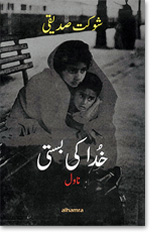By Shams Ur Rehman Alavi
For years, Akram Allahabadi's detective novels that were once a rage, had become rarer to find.
Finally, there is good news, as his family has decided to print his novels once again and bring them in public domain.
The website AkramAllahabadi.com has also been put up for the fans of the late author who wrote spy fiction for well over three decades.
Many today may not be aware about the magical world of Urdu detective fiction that was created by him.
It was in the post-independence era [starting from 1952-53], when detective fiction in the sub-continent reached dizzy heights.
Akram Allahabadi, who was born in Allahabad, and who had later settled in Mumbai, was among the most popular writers of the era.
In those days, his novels sold like hot cakes. Today, it is unimaginable the kind of following Akram Sahab or Ibn-e-Safi, had among masses.
Akram Sahab created many famous characters. Among them were Inspector Khaan and his assistant Baalay, Madhulkar and Raazi were most popular.
The novels were published in Urdu and Hindi, and were awaited every month by fans in India and Pakistan. But by 1990s, the novels were hard to found, except in libraries or personal collections.
In my childhood, I have seen almirahs full of Jasoosi Panja and Mahnama, in towns in UP. While Ibn-e-Safi novels were republished, Akram Allahabadi's (or Ilahabadi) works became rare to find.
Sometime back I spoke to a Delhi-based publisher who prints digests that has 2-3 old [Ibn-e-Safi's] detective novels every month [of course, without caring about royalty].
The publisher said that he tried hard but couldn't get Akram Sahab's novels. He asked me if I had any and said that he would love to purchase them and re-publish them.
Till recently, Akram sahab's famous novels like 'Sputnik', 'Junction Bilara', 'Salazar Series' and 'Operation Venus' were remembered. His forte was science fiction.
The website brings back the memories of the era. As an ardent fan, I expect at least of his famous novels to be made available [entire text, for free] for visitors to the website.
This would be a 'tabarruk' for his fans. Also, those who haven't read him before, will get to read at least one of his complete work.
The photographs of the master writer and his family, apart from covers of his novels, are treat to his fans. As a fan of the late writer, I am thankful to all those who helped create the website. Hope, they will keep updating and adding more novels to it. It's very important to keep his legacy alive.
Go, check the website: www.AkramAllahabadi.com
[You can read an earlier article, which I had written, on Akram Allahabadi sab at the other blog. HERE]
For years, Akram Allahabadi's detective novels that were once a rage, had become rarer to find.
Finally, there is good news, as his family has decided to print his novels once again and bring them in public domain.
The website AkramAllahabadi.com has also been put up for the fans of the late author who wrote spy fiction for well over three decades.
Many today may not be aware about the magical world of Urdu detective fiction that was created by him.
It was in the post-independence era [starting from 1952-53], when detective fiction in the sub-continent reached dizzy heights.
Akram Allahabadi, who was born in Allahabad, and who had later settled in Mumbai, was among the most popular writers of the era.
In those days, his novels sold like hot cakes. Today, it is unimaginable the kind of following Akram Sahab or Ibn-e-Safi, had among masses.
Akram Sahab created many famous characters. Among them were Inspector Khaan and his assistant Baalay, Madhulkar and Raazi were most popular.
The novels were published in Urdu and Hindi, and were awaited every month by fans in India and Pakistan. But by 1990s, the novels were hard to found, except in libraries or personal collections.
In my childhood, I have seen almirahs full of Jasoosi Panja and Mahnama, in towns in UP. While Ibn-e-Safi novels were republished, Akram Allahabadi's (or Ilahabadi) works became rare to find.
Sometime back I spoke to a Delhi-based publisher who prints digests that has 2-3 old [Ibn-e-Safi's] detective novels every month [of course, without caring about royalty].
The publisher said that he tried hard but couldn't get Akram Sahab's novels. He asked me if I had any and said that he would love to purchase them and re-publish them.
Till recently, Akram sahab's famous novels like 'Sputnik', 'Junction Bilara', 'Salazar Series' and 'Operation Venus' were remembered. His forte was science fiction.
The website brings back the memories of the era. As an ardent fan, I expect at least of his famous novels to be made available [entire text, for free] for visitors to the website.
This would be a 'tabarruk' for his fans. Also, those who haven't read him before, will get to read at least one of his complete work.
The photographs of the master writer and his family, apart from covers of his novels, are treat to his fans. As a fan of the late writer, I am thankful to all those who helped create the website. Hope, they will keep updating and adding more novels to it. It's very important to keep his legacy alive.
Go, check the website: www.AkramAllahabadi.com
[You can read an earlier article, which I had written, on Akram Allahabadi sab at the other blog. HERE]































